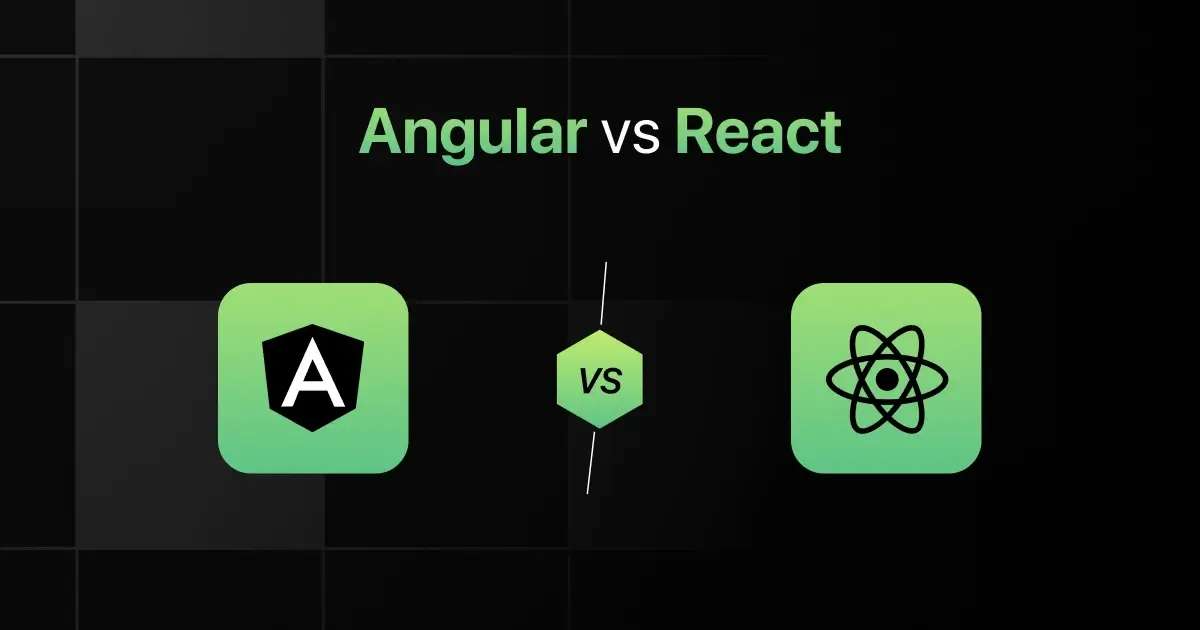Angular vs React: Key Differences

When comparing Angular and React, it’s important to look at what sets them apart. The discussion about Angular vs React is common among programmers deciding which framework to use for their projects.
The question of Angular vs React which is better? or Angular vs React which is best? depends on what you need for your specific project.
In this article, let’s know the differences between Angular vs React.
Angular vs React: Understanding the Key Differences
When comparing Angular and React, it’s crucial to understand the key distinctions that define their usage and capabilities.
One of the most important differences is that Angular is a full-fledged framework that provides a comprehensive solution for developing applications, making it ideal for large-scale application development. On the other hand, React is a library primarily used for building user interfaces with a high degree of flexibility and performance.
The following are other major differences between Angular and React:
| S. No. | Parameters | Angular | React |
|---|---|---|---|
| 1 | Developed By | ||
| 2 | Release Year | 2016 | 2013 |
| 3 | Paradigm | Full framework | UI library |
| 4 | Syntax | Uses TypeScript | Uses JSX (JavaScript XML) |
| 5 | Performance | Real DOM can be slower; optimized for SPA | Virtual DOM allows faster UI updates |
| 6 | Applications and Use Cases | Suited for enterprise-scale apps | Ideal for dynamic single-page applications |
| 7 | Learning Curve | Steeper due to comprehensive features | Relatively easy due to the modular nature |
| 8 | Libraries and Frameworks | Extensive built-in features and tools | Rich ecosystem but relies more on third-party libraries |
| 9 | Platform Independence | Runs on web, mobile (via Ionic), desktop | Runs on web, mobile (via React Native), desktop |
| 10 | Concurrency and Multithreading | Managed by Zone.js for asynchronous tasks | Uses React Fiber for handling concurrency |
| 11 | Tooling and IDE Support | Strong tooling with CLI and popular IDEs support | Strong community support and compatibility with many IDEs |
| 12 | Memory Management | Managed within the framework; less manual control | Managed by developer; more control |
| 13 | Error Handling | Detailed and structured error handling | Propagation of errors through component trees |
| 14 | Security | Built-in protection against common vulnerabilities | Requires careful handling of XSS vulnerabilities |
| 15 | Scalability | High scalability with proper architecture | Highly scalable with correct patterns |
| 16 | Key Features | Dependency injection, Two-way data binding | Virtual DOM, JSX, unidirectional data flow |
| 17 | Integration with Other Technologies | Integrates with various backend and frontend technologies | Seamless integration with other JavaScript frameworks |
| 18 | Community and Support | Strong official support and community | Larger developer community and third-party libraries support |
| 19 | Job Opportunities | Strong demand in enterprises | Widespread use across industries, higher demand |
| 20 | Future Prospects | Continuously evolving with Angular updates | Evolving with ecosystem and tooling improvements |
Angular vs React: Which One to Choose?
Choosing between Angular and React can be challenging, but by understanding their distinct advantages, you can make an informed decision.
Choose Angular If:
- You are pursuing a career as a front-end, back-end, or full-stack developer in industries leveraging modern web technologies, especially where large-scale applications are developed.
- You value strong typing and scalable tools that enhance code quality and maintainability, supported by an extensive array of TypeScript-specific tools and widespread community contributions.
- You require a language that compiles into JavaScript, offering similar execution speeds but with added type safety and scalability which can lead to more efficient code management and fewer runtime errors.
- You need compatibility across all platforms that support JavaScript, benefitting from TypeScript’s ability to provide additional structure and robustness to projects running on diverse systems.
- You focus on developing complex web applications, enterprise-level software, or any project that benefits from strong type-checking, such as large-scale front-end frameworks like Angular.
Choose React If:
- You aim for roles such as web developer, UI/UX developer, or mobile app developer, especially in startups, digital media agencies, and tech companies focusing on rapid deployment and prototyping.
- You appreciate a language with a massive ecosystem of libraries and frameworks like React, Node.js, and Express, which facilitate quick development across a range of applications from servers to client-side interfaces.
- You prioritize a language renowned for its fast execution speeds necessary for real-time web applications and dynamic website content, optimizing both time-to-interactive and overall user experience.
- You require a universally supported language that operates natively on all modern browsers and platforms, making it the standard choice for client-side scripting.
- You work on dynamic web projects, interactive websites, and real-time applications that benefit from JavaScript’s event-driven non-blocking architecture, making it ideal for tasks requiring high user interaction and data updates.
Final Words
The main difference between Angular and React lies in their design and use.
The purpose of understanding the Angular vs React difference is to choose the right tool for the job, depending on factors like the project’s size and how easy it is to maintain.
Frequently Asked Questions
1. What are the key differences between Angular and React?
- Angular is a full-featured framework with built-in solutions like routing and form validation; React is a UI-focused library.
- Angular defaults to TypeScript for static typing and benefits; React uses JavaScript but can also integrate TypeScript.
- React uses a virtual DOM for efficient updates; Angular uses real DOM with direct change detection.
- Angular promotes a structured development process; React allows more flexibility with its component-based architecture.
2. Which is better Angular or React? Which one to choose?
The choice between Angular and React depends on specific project requirements, team expertise, and preferences for architecture and development approaches.
3. Which is faster, Angular or React?
React generally has faster DOM updates due to its efficient virtual DOM implementation, which can lead to better performance in dynamic applications.
4. What are the primary use cases of Angular and React?
Angular is suited for enterprise-level applications and large teams needing a full-fledged solution, while React is ideal for flexible, high-performance single-page applications.
5. Which one is easy to learn for Beginners, Angular or React?
React is often considered easier to start with due to its simpler concepts and fewer built-in abstractions compared to Angular’s comprehensive environment.
6. Can Angular and React run on different platforms?
Both Angular and React can run on various platforms, including web, mobile, and desktop, through respective ecosystems and tools like Ionic for Angular and React Native for React.
7. Can I develop mobile apps using Angular and React?
Yes, mobile applications can be developed using Angular with frameworks like Ionic, or React with React Native, both supporting cross-platform mobile development.
8. What are the job prospects for Angular developers versus React developers?
Job prospects are excellent for both, with React developers currently in higher demand due to its popularity and widespread use in the industry.
Explore More Angular Resources
Explore More React Resources
Explore More Comparisons
Related Posts

Golang Interview Questions
Are you preparing for your first Golang interview and wondering what questions you might face? Understanding the key Golang interview questions …









